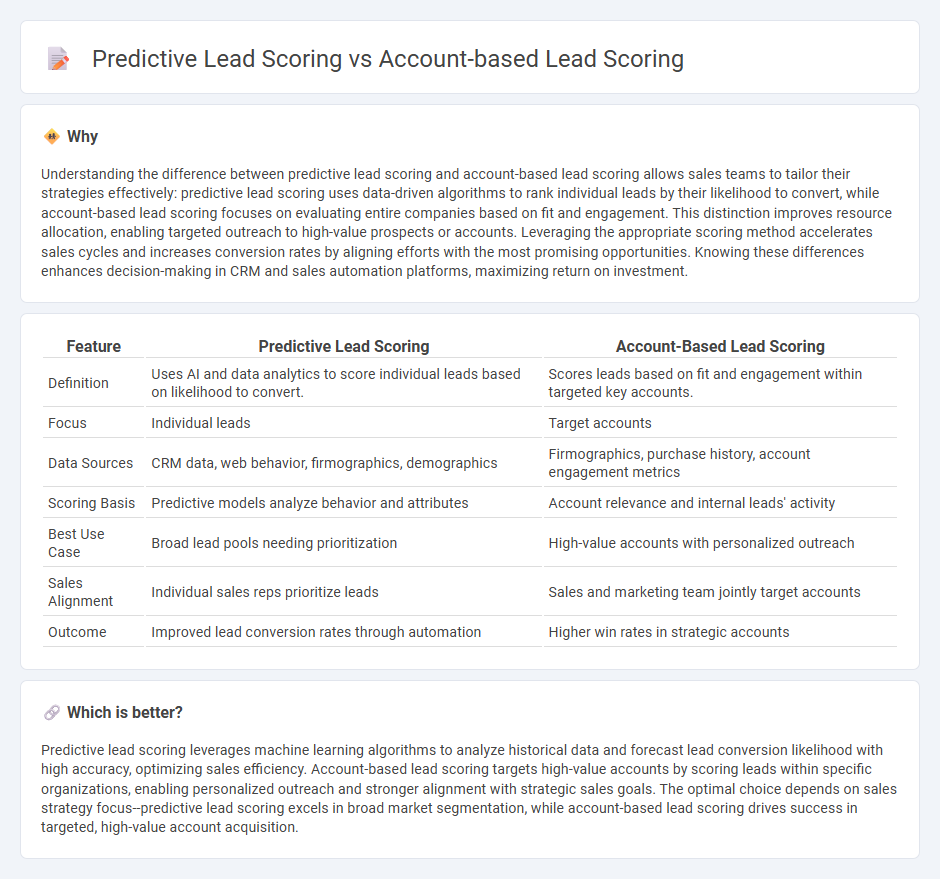
Predictive lead scoring utilizes machine learning algorithms to analyze historical data and predict the likelihood of leads converting, enhancing sales efficiency by prioritizing high-value prospects. Account-based lead scoring focuses on evaluating the potential of entire accounts rather than individual leads, aligning sales efforts with strategic business targets and improving collaboration between marketing and sales teams. Discover how integrating predictive and account-based lead scoring can revolutionize your sales strategy and boost conversion rates.
Why it is important
Understanding the difference between predictive lead scoring and account-based lead scoring allows sales teams to tailor their strategies effectively: predictive lead scoring uses data-driven algorithms to rank individual leads by their likelihood to convert, while account-based lead scoring focuses on evaluating entire companies based on fit and engagement. This distinction improves resource allocation, enabling targeted outreach to high-value prospects or accounts. Leveraging the appropriate scoring method accelerates sales cycles and increases conversion rates by aligning efforts with the most promising opportunities. Knowing these differences enhances decision-making in CRM and sales automation platforms, maximizing return on investment.
Comparison Table
| Feature | Predictive Lead Scoring | Account-Based Lead Scoring |
|---|---|---|
| Definition | Uses AI and data analytics to score individual leads based on likelihood to convert. | Scores leads based on fit and engagement within targeted key accounts. |
| Focus | Individual leads | Target accounts |
| Data Sources | CRM data, web behavior, firmographics, demographics | Firmographics, purchase history, account engagement metrics |
| Scoring Basis | Predictive models analyze behavior and attributes | Account relevance and internal leads' activity |
| Best Use Case | Broad lead pools needing prioritization | High-value accounts with personalized outreach |
| Sales Alignment | Individual sales reps prioritize leads | Sales and marketing team jointly target accounts |
| Outcome | Improved lead conversion rates through automation | Higher win rates in strategic accounts |
Which is better?
Predictive lead scoring leverages machine learning algorithms to analyze historical data and forecast lead conversion likelihood with high accuracy, optimizing sales efficiency. Account-based lead scoring targets high-value accounts by scoring leads within specific organizations, enabling personalized outreach and stronger alignment with strategic sales goals. The optimal choice depends on sales strategy focus--predictive lead scoring excels in broad market segmentation, while account-based lead scoring drives success in targeted, high-value account acquisition.
Connection
Predictive lead scoring and account-based lead scoring are interconnected through their reliance on data-driven insights to enhance sales efficiency. Predictive lead scoring uses machine learning algorithms to analyze historical data and identify high-potential leads, while account-based lead scoring focuses on evaluating the value and fit of entire accounts rather than individual leads. Combining these approaches allows sales teams to prioritize prospects and tailor outreach strategies, resulting in higher conversion rates and optimized resource allocation.
Key Terms
Target Accounts (Account-Based Lead Scoring)
Account-based lead scoring concentrates on evaluating the engagement and fit of specific target accounts to prioritize efforts on high-potential clients, enhancing B2B sales precision. Predictive lead scoring, in contrast, uses machine learning algorithms analyzing historical data and behavioral signals across leads to forecast conversion likelihood. Discover how integrating both strategies can maximize your lead qualification accuracy and sales efficiency.
Predictive Analytics (Predictive Lead Scoring)
Predictive lead scoring uses advanced predictive analytics and machine learning algorithms to analyze historical data, identifying patterns that indicate high-quality leads with greater accuracy compared to traditional account-based scoring. This approach evaluates a wide range of variables, including demographic, behavioral, and firmographic data, to forecast the likelihood of conversion. Explore how predictive lead scoring can transform your sales strategy through data-driven insights and improved lead prioritization.
Fit & Intent Signals
Account-based lead scoring emphasizes Fit signals such as company size, industry, and role alignment to target high-value accounts effectively. Predictive lead scoring leverages Intent signals by analyzing behavioral data and engagement patterns to forecast buying readiness. Explore deeper insights into leveraging Fit and Intent signals for optimized sales strategies.
Source and External Links
Account Score | Adobe Marketo Engage - Account-based lead scoring aggregates individual lead scores at the account level to help sales and marketing prioritize companies most likely to purchase.
B2B Account Scoring Done Right: Definition, Process, and Guide - Account-based lead scoring assesses the overall value of entire organizations, considering factors like size, industry, and fit with your ideal customer profile, rather than just individual lead behavior.
Account Scoring in ABM - Free Template and Guide - Unlike lead scoring, which evaluates individual prospects, account-based scoring ranks entire companies based on firmographic, technographic, and intent data to identify high-value accounts.
 dowidth.com
dowidth.com